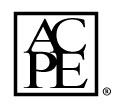| REQUEST PARKING » | MAP & DIRECTIONS » |
|
|
ARB 337
|
ARB 406
|
ARB 469
|
|
SESSION 1
12:15 pm – 1:00 pm
|
Alexa Townsend, Pharm.D.
Multi-system Inflammatory Disease Management in Childre |
Rachel Watson, Pharm.D.
Use of PCSK9 Inhibitors Following an Acute Coronary Event |
James Reimer, Pharm.D.
The Impact of Tranexamic Acid on Mortality and Neurologic Outcomes in Traumatic Brain Injury Patients |
|
1:00 pm – 1:05 pm
|
Break for Transition between Speakers
|
||
|
SESSION 2
1:05 pm – 1:50 pm
|
Alec Kuhn, Pharm.D.
Safety Considerations of Intravenous Iron in Cancer and Chemotherapy Induced Iron Deficiency Anemia |
Patrick Ladapo, Pharm.D.
Optimal Treatment Duration for Uncomplicated Gram-negative Bacteremia |
Erin Houry, Pharm.D.
Continuous Versus Intermittent Proton Pump Inhibitor Therapy for Upper Gastrointestinal Bleeds |
Registration is free, but is required in advance. Due to limited space, only those participants who register before 5:00 PM on Friday, November 13, 2020 will be able to request parking access on campus.
PARKING: To request parking, please first register for your desired sessions. Then, complete the parking questionnaire using the link above, or complete your parking request by clicking here>>>. If you do not request parking on our campus, or if you do not submit your request by the deadline, you will be re-directed upon arrival.
ATTENDANCE: All live participants will be required to sign in on the paper sheets, located within each room. Paper sign-in sheets will be reconciled against completed evaluations. Attendance for the virtual sessions will be captured once a participant joins the session and will be reconciled with completed evaluations. Any sessions that you did not attend will be removed from your account within two weeks following the seminars.
CPE CREDIT: Immediately following the presentation, registered participants will receive an email with a link to the evaluation. Within one week after attending the session, participants must complete this online evaluation. The CPE Administrator will submit each participant’s NABP number and date of birth combination to CPE Monitor for continuing education credit, no later than two weeks after the live presentation. Only ONE session may be claimed for each time block. If multiple concurrent sessions are claimed, or if a session is claimed that is not reflected on the paper sign or the attendance roster within Microsoft Teams Meeting, the offending participant forfeits CE credit.
SPECIAL ACCOMMODATIONS
Attendees of all abilities are welcome to participate. If you require reasonable accommodations, please notify Nicole Fields via email at Nicole.Fields@uhsp.edu in advance so that she may secure resources as soon as possible. Every effort will be made to make accommodations where necessary.
Date: Nov 18, 2020 12:00 PM - 02:00 PM
Fee
CE Hours
Activity Type
- Knowledge
Objectives
- Select the appropriate first line management of Multi-system Inflammatory Disease in Children
- Compare and contrast MIS-C from Kawasaki Disease
- Identify the appropriate diagnoses of MIS-C in a clinical case
Speaker(s)/Author(s)
|
Alexa Townsend, Pharm.D. |
Activity Number
0033-0000-20-076-L01-PCE Hours
Location
Objectives
- Based on the literature available, identify the main conclusions of the use of PCSK9 inhibitors for the use of secondary prevention of acute coronary events
- Describe the place in therapy for PCSK9 inhibitors in the prevention of secondary acute coronary events
- Identify patients who may benefit from the use of PCSK9 inhibitors as part of their lipid-lowering therapy to reduce the risk of secondary acute coronary events
Speaker(s)/Author(s)
|
Rachel Watson, Pharm.D. |
Activity Number
0033-0000-20-071-L01-PCE Hours
Location
Objectives
- Describe the underlying pathophysiology and coagulopathy in traumatic brain injury (TBI)
- Identify the rationale of administering tranexamic acid (TXA) in bleeding casualties
- Explain the potential role of TXA in patients with TBI
Speaker(s)/Author(s)
|
James Reimer, Pharm.D. |
Activity Number
0033-0000-20-072-L01-PCE Hours
Location
Objectives
- Discuss the prevalence and causes of cancer/chemotherapy associated iron deficiency anemia
- Summarize current evidence regarding long-term safety implications of IV iron use in cancer/chemotherapy induced iron deficiency anemia
Speaker(s)/Author(s)
|
Alec Kuhn, Pharm.D. |
Activity Number
0033-0000-20-075-L01-PCE Hours
Location
Objectives
- Compare and contrast complicated and uncomplicated gram-negative bacteremia
- Recommend appropriate therapy duration for uncomplicated gram-negative bacteremia based on clinical presentation
Speaker(s)/Author(s)
|
Patrick Ladapo, Pharm.D. |
Activity Number
0033-0000-073-L01-PCE Hours
Location
Objectives
- Explain how Helicobacter pylori, nonsteroidal anti-inflammatory drugs, and stress-related mucosal damage cause peptic ulcers and upper gastrointestinal bleeds
- Describe the mechanism of action of proton pump inhibitors in the treatment of upper gastrointestinal bleeds
- Select an appropriate treatment regimen for patients with upper gastrointestinal bleeds
Speaker(s)/Author(s)
|
Erin Houry, Pharm.D. |
